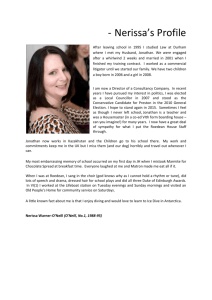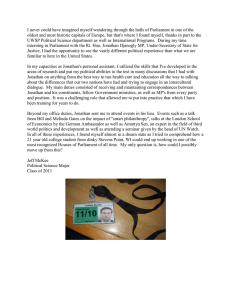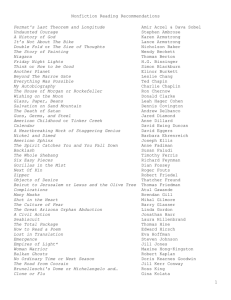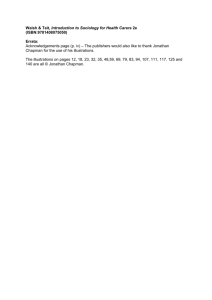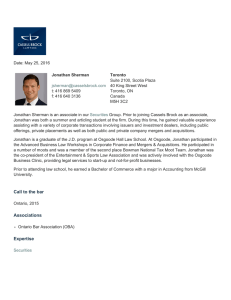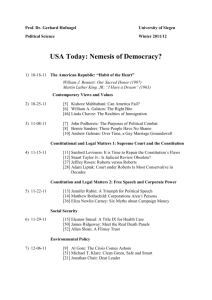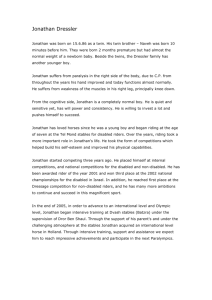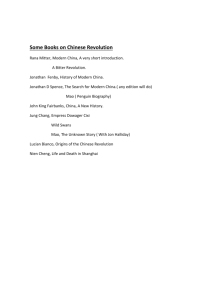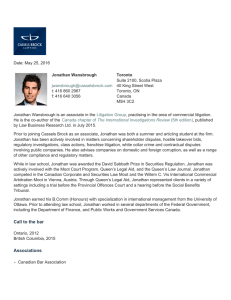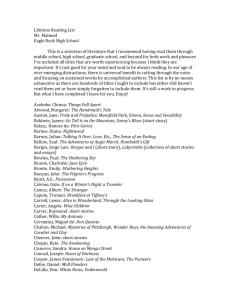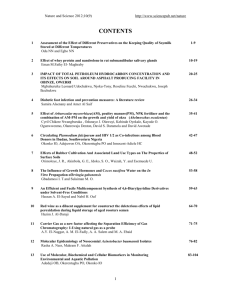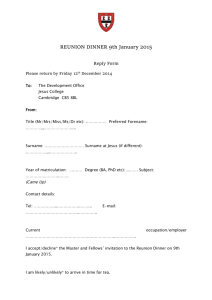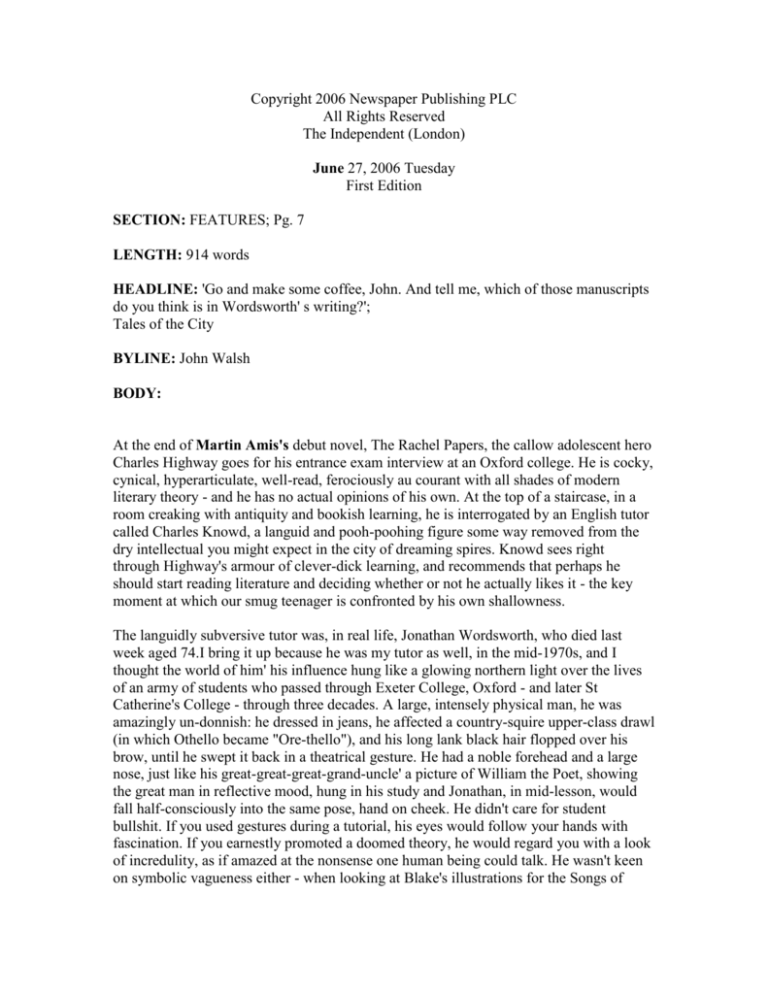
Copyright 2006 Newspaper Publishing PLC
All Rights Reserved
The Independent (London)
June 27, 2006 Tuesday
First Edition
SECTION: FEATURES; Pg. 7
LENGTH: 914 words
HEADLINE: 'Go and make some coffee, John. And tell me, which of those manuscripts
do you think is in Wordsworth' s writing?';
Tales of the City
BYLINE: John Walsh
BODY:
At the end of Martin Amis's debut novel, The Rachel Papers, the callow adolescent hero
Charles Highway goes for his entrance exam interview at an Oxford college. He is cocky,
cynical, hyperarticulate, well-read, ferociously au courant with all shades of modern
literary theory - and he has no actual opinions of his own. At the top of a staircase, in a
room creaking with antiquity and bookish learning, he is interrogated by an English tutor
called Charles Knowd, a languid and pooh-poohing figure some way removed from the
dry intellectual you might expect in the city of dreaming spires. Knowd sees right
through Highway's armour of clever-dick learning, and recommends that perhaps he
should start reading literature and deciding whether or not he actually likes it - the key
moment at which our smug teenager is confronted by his own shallowness.
The languidly subversive tutor was, in real life, Jonathan Wordsworth, who died last
week aged 74.I bring it up because he was my tutor as well, in the mid-1970s, and I
thought the world of him' his influence hung like a glowing northern light over the lives
of an army of students who passed through Exeter College, Oxford - and later St
Catherine's College - through three decades. A large, intensely physical man, he was
amazingly un-donnish: he dressed in jeans, he affected a country-squire upper-class drawl
(in which Othello became "Ore-thello"), and his long lank black hair flopped over his
brow, until he swept it back in a theatrical gesture. He had a noble forehead and a large
nose, just like his great-great-great-grand-uncle' a picture of William the Poet, showing
the great man in reflective mood, hung in his study and Jonathan, in mid-lesson, would
fall half-consciously into the same pose, hand on cheek. He didn't care for student
bullshit. If you used gestures during a tutorial, his eyes would follow your hands with
fascination. If you earnestly promoted a doomed theory, he would regard you with a look
of incredulity, as if amazed at the nonsense one human being could talk. He wasn't keen
on symbolic vagueness either - when looking at Blake's illustrations for the Songs of
Innocence, he'd say, "So you say this burning tree is meant to be the organ of generation,
do you? Hmm. Does your cock look like that?"
He could be a little old-fashioned about knowing what was what: if he told you to come
to his rooms on Staircase One at teatime, it was the height of folly to show up at 4pm or
5pm, or any time that wasn't 4.30pm. When the girls from St Hugh's (all the colleges
were single-sex in those far-off days, children) came along to share criticism classes with
us at noon on Fridays, Jonathan would regale the scholars with sherry' just in case anyone
couldn't stomach his bone-dry fino, he brought an alternative along. "Would you care for
the dry?" he would enquire, "or the [shudder] slightly less dry?" We had no idea such
sophistication existed.
He was good at making you feel your opinion counted. Once I arrived at a 9am tutorial to
find him stripped to the waist and shaving in the tiny bedroom off his study. "Go and
make some coffee, John," he said, "and tell me which of the manuscripts on the floor is in
Wordsworth's writing." On the carpet were four photostats of handwritten poetry, sent to
Jonathan by an American academy to be authenticated (or not) as the true hand of his
ancestor. He and I spent a jolly hour comparing loops and crossed Ts, trying to decide
whether a few sheets of paper were worth $100,000 or nothing at all to some professors
at the University of Austin, Texas. I think they might have been startled by our notterribly-scientific authentication methods. I could feel the picture of William on the wall
behind me, silently intrigued to think that everyone should be so interested in him still.
Jonathan made academicism seem exciting. He treated texts as things to be understood
only gradually, to be decoded and investigated and given a human context. If you
volunteered a reason why T S Eliot might have used the word "cogitations" in a poem,
Jonathan would (if you were lucky) say, "Yairs, I think that's right" - absolute heresy in
modern literature circles. He distrusted theory and clung to unfashionable notions of
subjectivity: he said literary criticism started in establishing whether a piece of writing
moved you or didn't, and writing about your personal response. He was the tutor-as-hero,
who taught us that learning to feel was a process no less important than learning to think.
I must admit my jaw dropped a yard on Friday night when Jonathan Ross asked David
Cameron if he'd ever pleasured himself, at the age of 13, while thinking of Mrs Thatcher.
The BBC received 27 complaints about the interchange ("No" was broadly the answer)
and a spokesman said "[Ross] has got a tongue-in-cheek approach and his interviewing
technique features a lot of innuendo." So that's innuendo is it, saying "Did you or did you
not have a wank while thinking 'Margaret Thatcher'?" Heaven help us when Mr Ross
drops the subtlety and starts being direct.
I feel that something of a breakthrough has been reached in the interface between politics
and the media, and in the directness of the interviewer's approach. I see no reason why
John Humphrys shouldn't confront John Reid on Today one morning with the words,
"Home Secretary, I put it to you that you have a gigantic crush on Hazel Blears. Come
on, admit it. You lie awake all night thinking of riding on her motorbike..."

